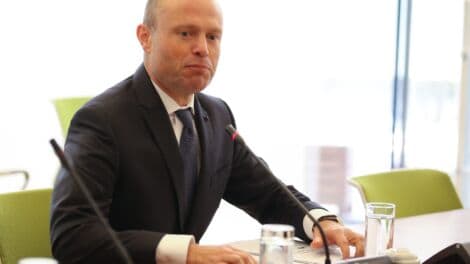
In 2003 Joseph Muscat talked himself into believing the Labour Party had won their anti-EU campaign. The ‘No’ votes were far fewer than the ‘Yes’ votes and yet he celebrated in the street. I say talked himself into believing it. I have no idea what he believed. I can only look at how he acted. He certainly believed that if he acted like he believed it other people would believe it too.
If a man thinks he can fool a country into drawing the wrong conclusion about which glass of two is fuller, does it surprise anyone that he thinks he can fool a country into pulling innocence out of a hat of guilt?
Maltatoday’s headline today – “Muscat plays home in strong defence of Electrogas contract” – shows how impressive he can look when twisting truths and scrubbing people’s direct recollections from their memory and judgement. People in the PAC and those who watch it closely had read with astonishment the harsh judgement of the Auditor General. And yet Joseph Muscat had the room nod yesterday as he claimed the Auditor General had found no wrong.
Here are facts nobody, not even Joseph Muscat, can deny:
- Joseph Muscat and the Labour Party had meetings with the Apap Bologna and Fenech families before the 2013 election. He makes claims about what was and was not said which Apap Bologna and Fenech corroborate. Which they would.
- The Labour Party had an MOU with a potential bidder for the power station contract when it was still an opposition party. Joseph Muscat insists that the fact that the signatory of the Memorandum of Understanding did not eventually win the contract “proves” there was nothing wrong about the MOU. Just because the deal didn’t work out does not disprove the fact that they meant it to. If not for it to work out, why else would they have signed an MOU?
- The relationship that Labour struck up with the regime of Azerbaijan has its origins in the bribery and corruption scandal in the Council of Europe where senior Labour figures were involved. Joseph Muscat speaks of Joe Debono Grech’s introduction as something providential when it is no better than your leader taking you up to meet the district boss.
- Keith Schembri and Konrad Mizzi (and a third person) had companies set up in Panama within days of the 2013 election. The paperwork for those companies showed they would receive money from a company that would later turn out to be owned by the negotiator for Shanghai Electric (Chen Cheng) and a company that would later turn out to be owned by the CEO of Electrogas (Yorgen Fenech). We will proceed with the official fiction that the third company did not belong to Joseph Muscat while we watch his every effort to prevent an objective determination of that fact.
- Konrad Mizzi negotiated the part sale of Enemalta to Shanghai Electric, shaking hands with the same Chen Cheng who Konrad Mizzi’s accountants told a secretive Panama law firm was getting ready to pour millions in his pockets.
- Brian Tonna, who set up the companies for Keith Schembri, Konrad Mizzi, and the third person, also set up offshore structures for Chen Cheng.
- Brian Tonna was an advisor to Joseph Muscat when he came to office, that’s while the name plate outside his office proclaimed him the owner of Mossack Fonseca (Malta) Ltd.
- Brian Tonna’s firm wrote the terms of reference for the procurement of the power station contract.
- Brian Tonna’s firm drove the selection of Electrogas.
- Yorgen Fenech’s company was a client of Brian Tonna’s firm.
- The Panama Papers exposed Keith Schembri and Konrad Mizzi in 2016. Joseph Muscat refused to fire them until days before his own resignation in November 2019.
- The source of private funding for the so-called public-private partnership in the Electrogas project was Gasol which went bust before putting up a penny. The deal with the rest of the Electrogas consortium, although they had no intention of putting up any money to replace what Gasol had committed, went ahead anyway.
- The so-called private funding of the project was put up by government-controlled Bank of Valletta which advanced to Electrogas double the revenue the bank makes in a year. The risk was covered by government guarantees, which means that the so-called investors took no risk.
- Konrad Mizzi drove a so-called investment by Enemalta in a windfarm in Montenegro. It later emerged the deal was flipped through a company owned by the Azerbaijani interest in Electrogas and Yorgen Fenech who pocketed nearly €5 million inside of three weeks for doing nothing at all.
- Keith Schembri, Joseph Muscat, and Yorgen Fenech kept up a private WhatsApp group where they at the very least exchanged photographs of women and cooking recipes. On the eve of Yorgen Fenech’s arrest for the murder of Daphne Caruana Galizia the three men were communicating extensively. Yorgen Fenech lavished expensive gifts on Joseph Muscat. This was still happening when Joseph Muscat knew Yorgen Fenech was being investigated for murder which he explained by saying that if he had to decline Yorgen Fenech’s very expensive gifts, Yorgen Fenech would find the behaviour out of the ordinary.
- A third of Electrogas is owned by Azerbaijani state-owned gas company SOCAR and yet SOCAR does not provide gas to Electrogas because it makes more money from the deal by re-selling to Electrogas fuel it purchases for much less from the market (which fuel Enemalta could purchase directly saving consumers the double cost of SOCAR’s and Electrogas’s profits).
Joseph Muscat can sweet-talk us till kingdom come. The fact is he fucked the country over.